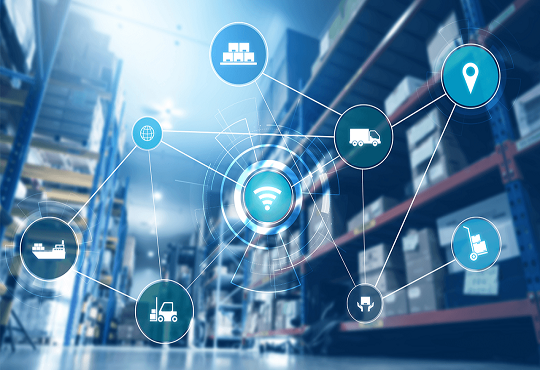Unleashing the Potential of Blockchain for Supply Chain Optimization
Sudhakar Singh, Editor, CIOTechOutlook | Sunday, 12 February 2023, 02:27 IST

The blockchain technology for enterprises is proving its use after security and transparency reached a new level altogether. This technology is used not only in the field of supply chain management but also in the area of owning shared assets like real estate, equities and any other physical asset due to the distributed nature of the blockchain ledger that allows the real-time tracking of raw materials, products, and other assets from their origin to the destination. It offers enterprises a greater degree of transparency and traceability in their supply chain operations which can be used to improve the risk management and fraud prevention areas.
Given the numerous advantages, the blockchain in supply chain market size is projected to surge at a CAGR of more than 50 percent by 2028. Amidst its many benefits, there are a lot of issues in adopting blockchain in supply chain management such as scalability, interoperability, and performance etc. Let us look at the first of these barriers against adopting blockchain supply chain management and how they can be tackled.
Scalability
The issue of scalability of a blockchain in supply chain management is dependent on the kind of blockchain required, the size of the network and the number of transactions that require processing. Bitcoins, along with some other cryptocurrencies, have limited ability to scale, therefore they become unsuitable for larger networks. Compared to the others like Ethereum, the existing blockchains are not so adept to handle larger networks and more transactions, although the scalability issues still exist and the transactions take longer than with a traditional database.
To scale a blockchain for supply chain management properly, it is important that the network should have a good node distribution and a consensus mechanism capable of a high level of throughput. Nodes also must be interfaced with existing supply chain systems and be data and analytical enabled. Additionally, the smart contract platform should be applied to automate processes, including, but not limited to, the strict enforcement of contracts. Moreover, the use of technologies such as sharding, sidechains and off-chain storage will also allow for better scalability and throughput.
Data Immutability
A concern with regard to data immutability as far as it relates to the blockchain implementation in supply chain management is that one has to take into consideration what data is to be stored and monitored as well as how this data is kept secure and tamper-proof. A blockchain is a distributed, immutable ledger which is used to store the sensitive data and which cannot be modified or altered. Thus, all changes and operations with the data must have been verified by the participants of the chain and recorded in the register before being updated to the chain therefore making it difficult to be manipulated.
Nevertheless, immutability that comes with it is something that should be very worried about. For instance, if the data is erroneous or incomplete, the ledger cannot be amended without posing a great threat to its integrity. This is also true for the blockchain system which consumes a lot of system costs and the mining fees for the data management and curation of the large amounts of data. Thus, it is imperative to carefully evaluate what data should be stored on the blockchain and which methods should be adopted to be sure that the data is correct and up-to-date.
Data Confidentiality
Data confidentiality should be one of the key issues to be considered while integrating the blockchain technology in the supply chain management world. The reason for this is the fact that blockchain is not secure. It has a very secure and immutable audit trail, but it has also created a space where everyone with access can see the data that is stored, like the customer information and the financial information, on the chain.
Therefore, one must put in place many security measures so that the information can be protected from falling into wrong hands yet the users will get the access they require. Furthermore, such private keys, access management, as well as data encryption methods and authentication protocols are also employed. These measures can be the means of assistance to maintain confidentiality surrounding the data and only the ones that have been authorised to can have the view of the records. Moreover, it is possible to supervise the effects and control the outcomes with the help of mechanisms like smart contracts which are able to detect the occurrence of privacy violations and to make the transaction process in the most efficient way.
Interoperability
Interoperability is one of the major challenges of implementing blockchain for supply chain management. Different organizations have different use cases and processes, resulting in different ways of leveraging blockchain. This can lead to the issue of different platforms not being able to integrate and communicate which each other.
To solve this issue, organizations can employ standards that ensure that the blockchains being employed are all interoperable. Standards such as Ethereum’s ERC20, Hyperledger Fabric and other protocols allow for blockchains to interact with each other. Additionally, companies can collaborate on initiatives such as the Hyperledger ZeppelinOS to facilitate proper integration between blockchains.
Performance and Efficiency
Performance and efficiency of blockchain implementation for supply chain management depends on the network design and scalability. To avoid storage and processing bottlenecks, the implementation should be modular and flexible. Achieving the desired performance requires efficient protocols and algorithms tailored to the requirements of the use case.
Various consensus protocols must be implemented in order to improve the performance and sustainability of the blockchain implementation. Protocols such as Proof of Work, Proof of Stake, Practical Byzantine Fault Tolerance, and Delegated Proof of Stake offer distinct advantages when managing the supply chain. These protocols can also help to provide a balance between trust, security, and efficiency.
“Blockchain technology provides a decentralized and secure database that records every transaction along the supply chain. Picture real-time tracking and traceability of products, with regularized updates on each stated leg of a journey,” says Henry Duckworth, COO of AgriDex.
All things considered, blockchain technology is expected to revolutionize supply chain management, facilitating smoother processes and more efficient use of resources. A successful implementation of this disruptive technology could significantly improve the efficiency, quality, and reliability of the end-to-end supply chain.




